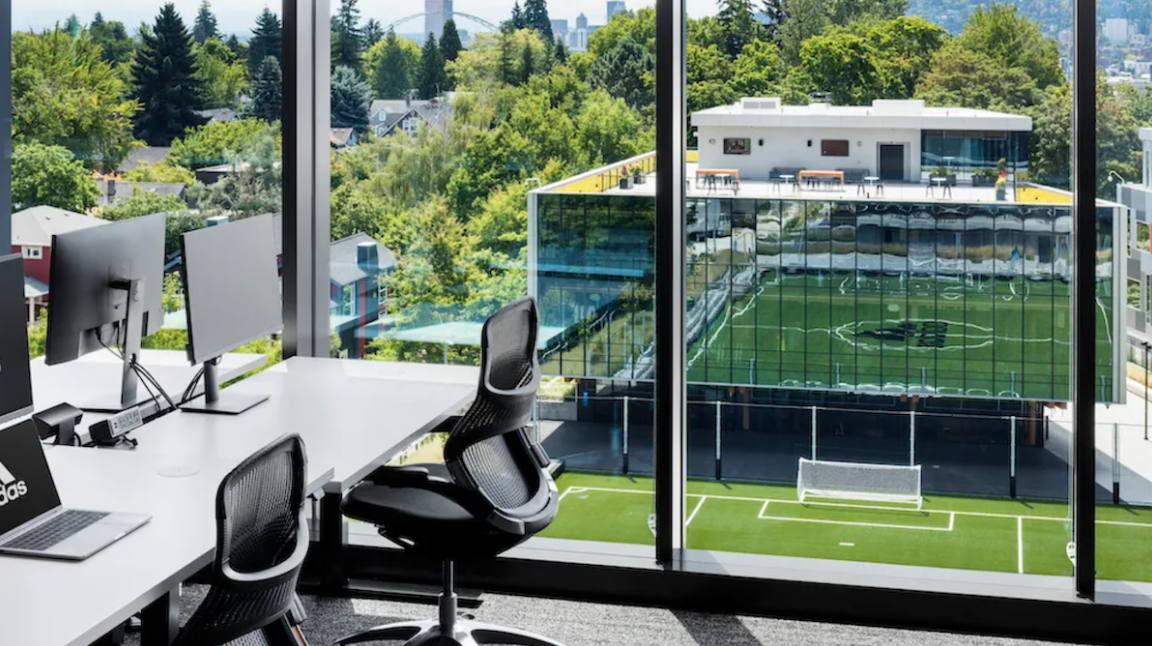Is the Hybrid Office Model Sustainable for the Shoe Industry? These Companies Seem to Think So — for Now
With pandemic anxiety mainly a thing of the past, major corporations have begun upping their in-office requirements for employees.
Just last week, Nike announced it was increasing its office requirement for its Beaverton, Ore. employees to four days a week, up from its three days a week requirement that had been in place since May of 2022. In a statement, Nike said it has “seen the power and energy that comes from working together in person, and we aim to create more of that.”
The move is part of a growing return-to-office movement happening across corporate America. Amazon CEO Andy Jassy in February announced that employees would be required to be in the office three days a week starting in May. Apple, Goldman Sachs and other companies have also increased their office time requirements. About 64 percent of CEOs said they expect to see a full return to the office by 2026, according to a recent KPMG survey of more than 1,300 global CEOs. And eighty-seven percent said they are more likely to reward employees who come into the office with better assignments, raises or promotions.
At the same time, employees have become accustomed to the flexibility of hybrid work and many are against coming back full time. At Amazon, for example, many employees pushed back on the office requirement and signed a petition to have the policy removed.
“We’ve got this massive disconnect between what the companies are wanting and what people are wanting,” said Laura Putnam, a workplace well-being expert and founder of workplace wellness company Motion Infusion. “There does seem to be a growing body of studies trending toward indicating that productivity goes down when we’re working from home.”
In Microsoft’s 2022 Workplace Index survey of 20,000 people in 11 countries, 85 percent of leaders said hybrid work made it more difficult to be confident in employee productivity.
How footwear stacks up
But when it comes to footwear, few companies outside of Nike have announced major changes to their pandemic office set-ups.
In general, a hybrid model allows companies to maintain flexibility and in-person interaction among employees. And for some shoe companies, this appears to be the new standard.
“The new normal has been embraced by so many workers and to fully take that away would create a lot of negative repercussions,” Putnam said.
Adidas, for example, has not changed its hybrid model that it introduced in April of 2022, requiring U.S. employees to come into the office for three days or more a week, with the option to take an extra two weeks per year to work remotely from anywhere. Under Armour has also operated a three-day in office hybrid model since September.
Tapestry, the New York City-based parent company of Coach, Kate Spade and Stuart Weitzman, still offers its employees hybrid working model as well. And Crocs Inc., which owns Hey Dude and Crocs, said it has taken a “hybrid, role-based approach” to bringing employees back into an office depending on the nature of their job.
“We believe that in-person collaboration is an important part of our culture but recognize the importance of work-life flexibility, and Crocs, Inc. will continue to take a democratic approach to ensure that our workforces understand what this means to them individually based on their role,” a Crocs, Inc. spokesperson said in a statement. “The approach is working well for the enterprise, as we are seeing strong collaboration and people return to the office as needed.”
Wolverine Worldwide, which recently announced that it would close its Boston headquarters by the end of the year and consolidate its offices across the U.S. to its Rockford, Mich., campus, was not available for comment on its current office requirements for employees. However, open job listings for the company state that Wolverine requires three days a week in the office.
Staying fully remote
Other retail and footwear companies have kept offices entirely optional for some of its employees.
Bolt, which offers a one-click checkout product to retailers like Forever 21 and Lucky Brand, became a “remote-first” organization in March of 2020 and still operates as such, though the company does offer some office spaces for those who desire them.
At Zappos, warehouse employees work in person everyday, though corporate employees can choose how often, if at all, they want to come into the office.
“We still hold onsite, company culture events and activities, and employees who are locally based are encouraged to come in as frequently as able to foster the culture, but there is a lot of flexibility and nothing is mandated on this front,” Zappos said in a statement.
And Neiman Marcus Group this year opened its “Corporate Hub” concept in Dallas, Texas, where corporate employees will operate in a hybrid, remote-friendly environment that facilitates digital and in-person connection with other employees across the company. Last year, the retailer confirmed it would open multiple “corporate hubs” as opposed to having employees stationed at its one major headquarters in Dallas, Texas. NMG said at the time that most of its corporate workforce would remain in Dallas, with the option for some workers to primarily work out of new hubs in different cities. The initiative was done in response to feedback from employees who said they valued flexibility.
According to KPMG’s human capital advisory leader for consumer and retail Felicia Lyon, there is no “one-size-fits-all” approach is for CEOs to get employees back in the office.
“Research on work-from-home reveals that people are willing to give up pay to have more flexibility, so rewarding in-office time could be beneficial and help close the productivity gap between fully remote workers and hybrid,” she said. “However, mandated returns pose risks such as loss of diversity and adverse selection, morale and other issues — especially considering that people companies lose are those most able to job hop.”
